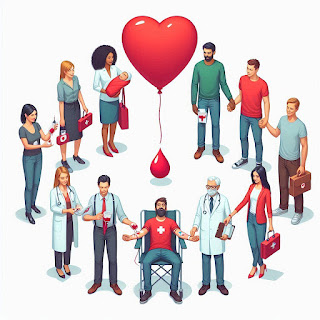Celebrating 20 Years of Giving: Thank You Blood Donors!
Celebrating 20 Years of Giving: Thank You Blood Donors!
Every year on June 14th, World Blood Donor Day is celebrated globally to raise awareness about the need for safe blood and to thank voluntary, unpaid blood donors for their life-saving gifts. This year, in 2024, marks a special milestone: 20 years of celebrating this crucial day. The theme, "20 Years of Celebrating Giving: Thank You Blood Donors!" highlights two decades of dedication and the lifesaving impact of blood donations. As we honor this milestone, it’s essential to understand how we can all contribute to maintaining healthy blood, which is vital for both donors and recipients. Nutrition plays a pivotal role in this, and in this blog, we’ll explore the foods important for healthy blood.
The Importance of Blood Donation
Blood donation is a selfless act that saves millions of lives each year. It is critical for surgeries, cancer treatment, chronic illnesses, and traumatic injuries. A single donation can save up to three lives, making every donor a hero. As we celebrate this milestone, it's crucial to understand how to keep our blood healthy and ready for donation.
Foods Important for Healthy Blood
Maintaining healthy blood involves ensuring that it has the right balance of red blood cells, white blood cells, platelets, and plasma. Here are key nutrients and foods that support healthy blood:
Iron-Rich Foods
Iron is crucial for the production of hemoglobin, the protein in red blood cells that carries oxygen throughout the body. Iron deficiency can lead to anemia, which is a common concern for blood donors.
Red Meat: Beef, lamb, and pork are excellent sources of heme iron, which is easily absorbed by the body.
Poultry: Chicken and turkey are also good sources of heme iron.
Leafy Greens: Spinach, kale, and Swiss chard are rich in non-heme iron, especially when cooked.
Legumes: Lentils, chickpeas, and beans provide non-heme iron and are great for vegetarians.
Fortified Cereals: Many breakfast cereals are fortified with iron.
Vitamin C-Rich Foods
Vitamin C enhances the absorption of non-heme iron from plant-based sources. Pairing vitamin C-rich foods with iron-rich foods can significantly improve iron absorption.
Citrus Fruits: Oranges, grapefruits, lemons, and limes.
Berries: Strawberries, blueberries, Gooseberries and raspberries
Bell Peppers: Red and green bell peppers are extremely high in vitamin C.
Folate-Rich Foods
Folate (vitamin B9) is essential for the production and maintenance of new cells, particularly red blood cells. A deficiency can lead to folate-deficiency anemia.
Leafy Greens: Spinach, kale, and romaine lettuce.
Legumes: Beans, peas, and lentils.
Citrus Fruits: Oranges, lemons, and limes.
Avocados: Rich in folate and healthy fats.
Vitamin B12-Rich Foods
Vitamin B12 is necessary for the production of red blood cells and the proper functioning of the nervous system. A deficiency can lead to megaloblastic anemia.
Animal Products: Meat, poultry, fish, and dairy products.
Fortified Foods: Cereals, plant-based milk, and nutritional yeast.
Vitamin K-Rich Foods
Vitamin K is crucial for blood clotting and wound healing. Ensuring adequate vitamin K intake helps maintain the balance of clotting factors in the blood.
Leafy Greens: Kale, spinach, and broccoli.
Cruciferous Vegetables: Brussels sprouts and cauliflower.
Fish and Meat: Some fish and liver are good sources of vitamin K.
Hydration
Staying hydrated is essential for maintaining healthy blood volume and circulation. Water is vital, but other fluids like herbal teas and natural fruit juices also contribute to hydration.
Healthy Eating Habits for Blood Donors
Balanced Diet: Ensure a balanced diet that includes a variety of fruits, vegetables, whole grains, lean proteins, and healthy fats.
Regular Meals: Avoid skipping meals and try to eat at regular intervals to maintain stable energy levels.
Limit Processed Foods: Reduce the intake of processed and high-sugar foods, which can negatively impact overall health and blood quality.
Stay Hydrated: Drink plenty of water, especially before and after donating blood.
As we celebrate 20 years of World Blood Donor Day with the theme "20 Years of Celebrating Giving: Thank You Blood Donors!", let's not only recognize the incredible contributions of blood donors but also emphasize the importance of maintaining healthy blood through proper nutrition. By incorporating iron-rich, vitamin C-rich, folate-rich, vitamin B12-rich, and vitamin K-rich foods into our diets, we can support our blood health and continue to save lives through donation. Here's to another 20 years of life-saving contributions and the heroes who make it possible!













Comments
Post a Comment